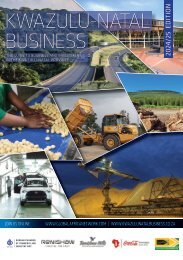Gauteng Business 2016 edition
The 2016 edition of the Gauteng Business and Investment Guide is the premier business and investment guide for the Gauteng province and the Gauteng Growth and Development Agency (GGDA). In addition to detailed profiles of key provincial organisations, including the GGDA, the Automotive Industry Development Corporation Centre (AIDC), the Gauteng Investment Centre, the Gauteng IDZ, the Gauteng ICT Park SEZ and Constitution Hill, this edition includes well-researched economic and demographic data on the province, as well as insights into the province’s five development corridors and the new industries and development nodes in these corridors; a focus on Gauteng as a global city region; and key growth sectors for the province.
The 2016 edition of the Gauteng Business and Investment Guide is the premier business and investment guide for the Gauteng province and the Gauteng Growth and Development Agency (GGDA). In addition to detailed profiles of key provincial organisations, including the GGDA, the Automotive Industry Development Corporation Centre (AIDC), the Gauteng Investment Centre, the Gauteng IDZ, the Gauteng ICT Park SEZ and Constitution Hill, this edition includes well-researched economic and demographic data on the province, as well as insights into the province’s five development corridors and the new industries and development nodes in these corridors; a focus on Gauteng as a global city region; and key growth sectors for the province.
Create successful ePaper yourself
Turn your PDF publications into a flip-book with our unique Google optimized e-Paper software.
SPECIAL FEATURE<br />
The cost of doing business<br />
in <strong>Gauteng</strong><br />
The cost of doing business in <strong>Gauteng</strong> is of key interest to investors and business owners<br />
looking to explore opportunities within this diverse economy – and the good news is that it<br />
is cheaper to do business here than in many of its overseas competition.<br />
With an average petrol price of US$5.06 per gallon (approximately<br />
R11.75 per litre), South Africa ranked 19th out of 60 countries in a<br />
2013 study comparing petrol prices. According to the study, petrol in<br />
South Africa is more expensive in comparison to Egypt (ranked 3rd)<br />
and Nigeria (ranked 6th), the other African countries included on the<br />
list. South Africa fares somewhat more favourably when compared<br />
with her BRIC counterparts (except Russia): petrol prices are higher in<br />
Brazil (ranked 21st at R12.54 per litre), similar in India (ranked 18th at<br />
R11.61 per litre) and China (ranked 15th at R11 per litre), and considerably<br />
lower in Russia (ranked 10th<br />
at R8.06 per litre).<br />
Electricity supply<br />
and tariffs<br />
With infrastructure spend of key importance to government,<br />
every effort is being made to create as competitive<br />
working environment as possible in the bustling<br />
greater <strong>Gauteng</strong> region, to stimulate further growth<br />
and aid job creation. This article explores some of the daily costs that<br />
companies and commuters can expect to pay.<br />
Petrol prices and other transport costs<br />
In recent years, South Africa’s<br />
electricity supply capacity has<br />
come under increasing pressure,<br />
with moribund infrastructure<br />
and capacity shortages necessitating<br />
the introduction of loadshedding<br />
around two years ago.<br />
As a result, Eskom, South Africa’s<br />
state-owned power generator<br />
and transmitter, has faced growing<br />
pressure amid ever-increasing<br />
demand for electricity.<br />
Labour, water and<br />
communication costs<br />
A 2012 report by UBS indicated<br />
that in 2009, Paris (France) had the<br />
shortest annual working hours of<br />
1 558 hours a year. Johannesburg<br />
(South Africa) reported an average<br />
1 887 hours a year, whereas Seoul<br />
reported 2 308 working hours a<br />
year. Comparing telephone costs<br />
for local calls globally, South Africa<br />
charged 7 US cents per threeminute<br />
call. The United Kingdom,<br />
on the other hand, charged 17 US<br />
cents for the same call.<br />
GAUTENG BUSINESS <strong>2016</strong><br />
40


















